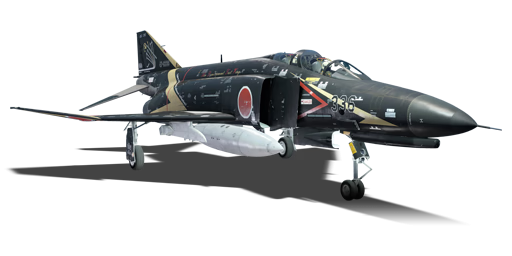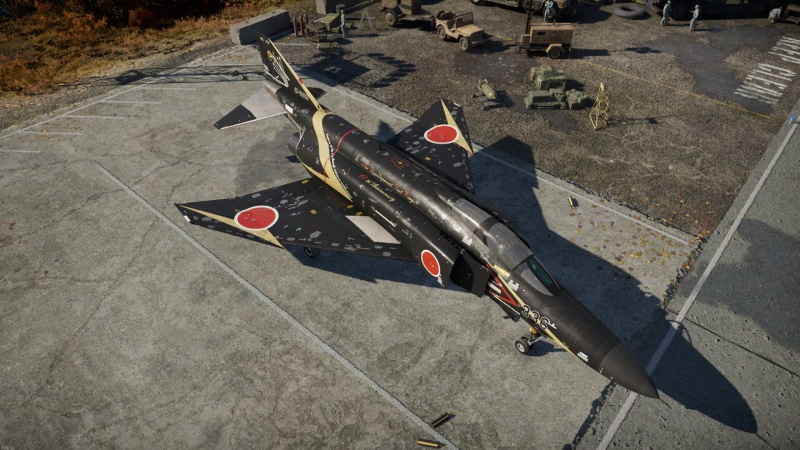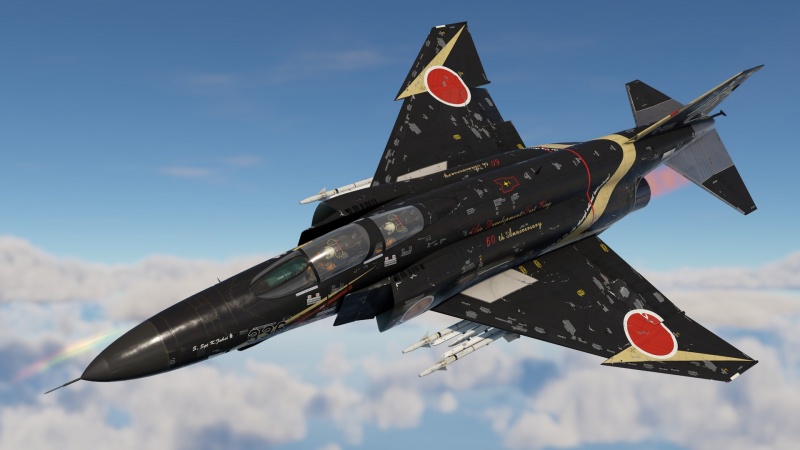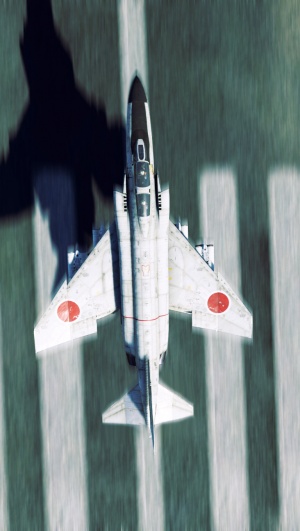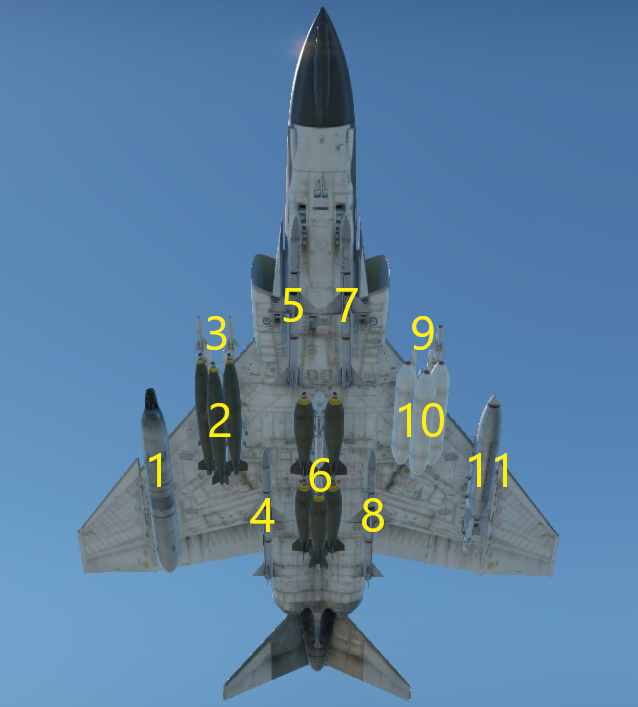Difference between revisions of "F-4EJ ADTW"
m (Tag: Visual edit) |
(→Armaments) |
||
| (10 intermediate revisions by 4 users not shown) | |||
| Line 12: | Line 12: | ||
== Description == | == Description == | ||
<!-- ''In the description, the first part should be about the history of and the creation and combat usage of the aircraft, as well as its key features. In the second part, tell the reader about the aircraft in the game. Insert a screenshot of the vehicle, so that if the novice player does not remember the vehicle by name, he will immediately understand what kind of vehicle the article is talking about.'' --> | <!-- ''In the description, the first part should be about the history of and the creation and combat usage of the aircraft, as well as its key features. In the second part, tell the reader about the aircraft in the game. Insert a screenshot of the vehicle, so that if the novice player does not remember the vehicle by name, he will immediately understand what kind of vehicle the article is talking about.'' --> | ||
| − | The '''{{Specs|name}}''' | + | The '''{{Specs|name}}''' (Air Development and Test Wing) was the first and last operator of the F-4EJ in Japan until its complete decommission in 2021. The ADTW specialized in pre-operational testing and verification of JASDF equipment. The F-4EJ was chosen as a testing platform for the ADTW because of its reliability, versatility and long service history in Japan. The F-4EJ was also a source of pride and nostalgia for many pilots and enthusiasts. |
| − | + | It was introduced in [[Update "Apex Predators"]]. This F-4EJ is completely identical to the researchable [[F-4EJ Phantom II]] in the tech tree, which in turn is a Japanese variant of the American F-4E Phantom II. It has a high versatility, as it can carry a large variety of weapons, such as bombs, rockets, air-to-air missiles and extra gunpods. The gunpods add more JM61 Vulcan cannons to the already abundant ammunition supply. However, it has a weak radar system, which limits the effectiveness of its 4 AIM-7 missiles. It also only has AIM-9P missiles as its best option for close-range combat. | |
== General info == | == General info == | ||
| Line 124: | Line 124: | ||
{| class="wikitable" style="text-align:center" | {| class="wikitable" style="text-align:center" | ||
|- | |- | ||
| − | ! colspan=" | + | ! colspan="5" | [[Ballistic Computer]] |
|- | |- | ||
| − | ! CCIP (Guns) !! CCIP (Rockets) !! CCIP (Bombs) !! CCRP (Bombs) | + | ! CCIP (Guns) !! CCIP (Rockets) !! CCIP (Bombs) !! CCRP (Bombs) !! EEGS |
|- | |- | ||
| − | | {{Tick}} || {{Tick}} || {{Tick}} || {{Tick}} | + | | {{Tick}} || {{Tick}} || {{Tick}} || {{Tick}} || {{Tick}} |
|- | |- | ||
|} | |} | ||
| Line 138: | Line 138: | ||
The '''''{{PAGENAME}}''''' is armed with: | The '''''{{PAGENAME}}''''' is armed with: | ||
| − | + | * 1 x 20 mm JM61A1 cannon, chin-mounted (640 rpg) | |
| − | + | * 30 x large calibre countermeasures | |
| − | ** | + | * 60 x countermeasures |
Due to this cannon's high rate of fire (only 6.60 seconds of continuous fire), trigger discipline is a must. | Due to this cannon's high rate of fire (only 6.60 seconds of continuous fire), trigger discipline is a must. | ||
| Line 147: | Line 147: | ||
{{Specs-Avia-Suspended}} | {{Specs-Avia-Suspended}} | ||
<!-- ''Describe the aircraft's suspended armament: additional cannons under the wings, bombs, rockets and torpedoes. This section is especially important for bombers and attackers. If there is no suspended weaponry remove this subsection.'' --> | <!-- ''Describe the aircraft's suspended armament: additional cannons under the wings, bombs, rockets and torpedoes. This section is especially important for bombers and attackers. If there is no suspended weaponry remove this subsection.'' --> | ||
| − | |||
| − | |||
| − | The '''''{{PAGENAME}}''''' can be outfitted with the following ordnance | + | The '''''{{PAGENAME}}''''' can be outfitted with the following ordnance: |
| − | + | {| class="wikitable" style="text-align:center" width="100%" | |
| − | |||
| − | |||
| − | |||
| − | |||
| − | |||
| − | |||
| − | |||
| − | |||
| − | |||
| − | |||
| − | |||
| − | |||
| − | {| class="wikitable | ||
|- | |- | ||
! !! width="4%" | 1 !! width="4%" | 2 !! width="4%" | 3 !! width="4%" | 4 !! width="4%" | 5 !! width="4%" | 6 !! width="4%" | 7 !! width="4%" | 8 !! width="4%" | 9 !! width="4%" | 10 !! width="4%" | 11 | ! !! width="4%" | 1 !! width="4%" | 2 !! width="4%" | 3 !! width="4%" | 4 !! width="4%" | 5 !! width="4%" | 6 !! width="4%" | 7 !! width="4%" | 8 !! width="4%" | 9 !! width="4%" | 10 !! width="4%" | 11 | ||
| − | | rowspan=" | + | | rowspan="13" width="30%" | <div class="ttx-image">[[File:Hardpoints_F-4C_Phantom_II.png]]</div> |
|- | |- | ||
| − | ! 20 mm GAU-4 cannons ( | + | ! [[GAU-4 (20 mm)|20 mm GAU-4]] cannons (1,200 rpg) |
| 1 || || || || || 1 || || || || || 1 | | 1 || || || || || 1 || || || || || 1 | ||
|- | |- | ||
| − | ! 500 lb LDGP Mk 82 bombs | + | ! [[LDGP Mk 82 (500 lb)|500 lb LDGP Mk 82]] bombs |
| 6 || 3 || || || || 6 || || || || 3 || 6 | | 6 || 3 || || || || 6 || || || || 3 || 6 | ||
|- | |- | ||
| − | ! 750 lb M117 cone 45 bombs | + | ! [[Mk 82 Snakeye (500 lb)|500 lb Mk 82 Snakeye]] bombs |
| + | | 6 || 3 || || || || 6 || || || || 3 || 6 | ||
| + | |- | ||
| + | ! [[M117 cone 45 (750 lb)|750 lb M117 cone 45]] bombs | ||
| 3 || 3 || || || || 5 || || || || 3 || 3 | | 3 || 3 || || || || 5 || || || || 3 || 3 | ||
|- | |- | ||
| − | ! FFAR Mighty Mouse rockets | + | ! [[FFAR Mighty Mouse]] rockets |
| 57 || 57 || || || || 57 || || || || 57 || 57 | | 57 || 57 || || || || 57 || || || || 57 || 57 | ||
|- | |- | ||
| − | ! Zuni Mk32 Mod 0 ATAP rockets | + | ! [[Zuni Mk32 Mod 0 ATAP]] rockets |
| 12 || 12 || || || || 12 || || || || 12 || 12 | | 12 || 12 || || || || 12 || || || || 12 || 12 | ||
|- | |- | ||
| − | ! AIM-7D Sparrow missiles | + | ! [[AIM-7D Sparrow]] missiles |
| || || || 1 || 1 || || 1 || 1 || || || | | || || || 1 || 1 || || 1 || 1 || || || | ||
|- | |- | ||
| − | ! AIM-7E Sparrow missiles | + | ! [[AIM-7E Sparrow]] missiles |
| || || || 1 || 1 || || 1 || 1 || || || | | || || || 1 || 1 || || 1 || 1 || || || | ||
|- | |- | ||
| − | ! AIM-9E Sidewinder missiles | + | ! [[AIM-9E Sidewinder]] missiles |
| || || 1, 2 || || || || || || 1, 2 || || | | || || 1, 2 || || || || || || 1, 2 || || | ||
|- | |- | ||
| − | ! AIM-9P Sidewinder missiles | + | ! [[AIM-9P Sidewinder]] missiles |
| || || 2 || || || || || || 2 || || | | || || 2 || || || || || || 2 || || | ||
|- | |- | ||
| − | | colspan="12" | Maximum permissible weight imbalance: 1,500 kg | + | ! 600 gal drop tanks |
| + | | || || || || || 1 || || || || || | ||
| + | |- | ||
| + | | colspan="12" | Maximum permissible loadout weight: 7,400 kg<br>Maximum permissible wing load: 3,000 kg<br>Maximum permissible weight imbalance: 1,500 kg | ||
|- | |- | ||
|} | |} | ||
| + | |||
| + | {{Navigation-Start|Default weapon presets}} | ||
| + | {{Navigation-First-Simple-Line}} | ||
| + | * 1 x 600 gal drop tank | ||
| + | * 2 x AIM-9E Sidewinder missiles | ||
| + | * 4 x AIM-9E Sidewinder missiles | ||
| + | * 4 x AIM-9P Sidewinder missiles | ||
| + | * 4 x AIM-7D Sparrow missiles | ||
| + | * 4 x AIM-7E Sparrow missiles | ||
| + | * 24 x 500 lb LDGP Mk 82 bombs (12,000 lb total) | ||
| + | * 24 x 500 lb Mk 82 Snakeye bombs (12,000 lb total) | ||
| + | * 17 x 750 lb M117 cone 45 bombs (12,750 lb total) | ||
| + | * 285 x FFAR Mighty Mouse rockets | ||
| + | * 60 x Zuni Mk32 Mod 0 ATAP rockets | ||
| + | * 3 x 20 mm GAU-4 cannons (1,200 rpg = 3,600 total) | ||
| + | {{Navigation-End}} | ||
== Usage in battles == | == Usage in battles == | ||
<!-- ''Describe the tactics of playing in the aircraft, the features of using aircraft in a team and advice on tactics. Refrain from creating a "guide" - do not impose a single point of view, but instead, give the reader food for thought. Examine the most dangerous enemies and give recommendations on fighting them. If necessary, note the specifics of the game in different modes (AB, RB, SB).'' --> | <!-- ''Describe the tactics of playing in the aircraft, the features of using aircraft in a team and advice on tactics. Refrain from creating a "guide" - do not impose a single point of view, but instead, give the reader food for thought. Examine the most dangerous enemies and give recommendations on fighting them. If necessary, note the specifics of the game in different modes (AB, RB, SB).'' --> | ||
| − | The F-4EJ Phantom is well-suited for | + | The F-4EJ Phantom is well-suited for ground attacks, with a generous amount of options for bombs and rockets. Against air targets, players may employ the vehicle's air-to-air missiles and deadly frontal cannon. If desired, three externally-mounted gun pods may be equipped, but note that these may not be useful in all situations. Although they will undoubtedly increase the vehicle's destructive capabilities, they also appreciably hinder flight performance. In many situations, one front-facing cannon is all that is required to dispatch an opponent aircraft. As for the infrared missiles, the ones used by this plane are decent in the game, comparable to the [[R-60]] missiles equipped by the [[MiG-21MF (Germany)]] and the [[MiG-21SMT]]. |
Thanks to its leading-edge flaps, the F-4EJ is more manoeuvrable than the [[F-4C Phantom II]]. Because of this, it can calmly deal with more intense dogfight situations than its predecessor. As with all top-tier fighter jets, extended turn fights should be avoided since they bleed much speed out of this heavy aircraft and leave the pilot defenceless against nearby vultures. Specifically, watch out for the [[J35D]] ''Draken'', which will beat any of its contemporaries in an extended turn, and also keep an eye on nearby [[Mitsubishi T-2]] pilots: although the T-2 doesn't do well in extended turns, it can pull a significant angle of attack in the first few moments of a turn fight. The [[F-4E Phantom II]] can also be considered a threat as it includes leading-edge slats not found on the F-4EJ. | Thanks to its leading-edge flaps, the F-4EJ is more manoeuvrable than the [[F-4C Phantom II]]. Because of this, it can calmly deal with more intense dogfight situations than its predecessor. As with all top-tier fighter jets, extended turn fights should be avoided since they bleed much speed out of this heavy aircraft and leave the pilot defenceless against nearby vultures. Specifically, watch out for the [[J35D]] ''Draken'', which will beat any of its contemporaries in an extended turn, and also keep an eye on nearby [[Mitsubishi T-2]] pilots: although the T-2 doesn't do well in extended turns, it can pull a significant angle of attack in the first few moments of a turn fight. The [[F-4E Phantom II]] can also be considered a threat as it includes leading-edge slats not found on the F-4EJ. | ||
| Line 215: | Line 222: | ||
* Fairly manoeuvrable thanks to leading-edge flaps, especially when low on fuel | * Fairly manoeuvrable thanks to leading-edge flaps, especially when low on fuel | ||
| − | + | * Equipped with countermeasures for evading enemy missiles | |
| − | * Equipped with | + | * A wide range of suspended armaments, suitable for multi-purpose playstyle |
| − | * A wide range of suspended armaments, suitable for | + | * Deadly frontal cannons with high burst mass |
| − | * Deadly frontal | ||
* Makes use of a ballistic computer for assisting in the aim of cannons, rockets, and bombs against ground targets | * Makes use of a ballistic computer for assisting in the aim of cannons, rockets, and bombs against ground targets | ||
'''Cons:''' | '''Cons:''' | ||
| − | * Unlike the [[F-4E Phantom II]], the F-4EJ does not have the Agile Eagle upgrade | + | * Unlike the [[F-4E Phantom II]], the F-4EJ ADTW does not have the Agile Eagle upgrade |
| + | * AIM-9P air-to-air missiles are less capable than most infrared missiles found at its BR | ||
| + | * Lacks the more capable [[AIM-7E-2]] Sparrow, only has the basic AIM-7E that takes longer to start manoeuvring so it is harder to use in short-range fights | ||
| + | * Lacks PD radar, making it significantly harder for radar missiles to track and hit in combat | ||
* Limited ammunition in the frontally-mounted cannon | * Limited ammunition in the frontally-mounted cannon | ||
* Quite large and heavy compared to other fighters at its rank | * Quite large and heavy compared to other fighters at its rank | ||
| Line 242: | Line 251: | ||
The F-4EJ Phantoms were equipped with 3 different colour schemes. Blue Camo, Green Camo, and Grey. 127 aircraft were built, with 8 squadrons adopting the plane. The F-4EJ was decommissioned in 2020 to adapt to the F-35A Lightning II. | The F-4EJ Phantoms were equipped with 3 different colour schemes. Blue Camo, Green Camo, and Grey. 127 aircraft were built, with 8 squadrons adopting the plane. The F-4EJ was decommissioned in 2020 to adapt to the F-35A Lightning II. | ||
| − | This F-4EJ sports the livery for the 60th Anniversary of the ADTW (Air Development and Test Wing 飛行開発実験団) as in 2015 for 47- | + | This F-4EJ sports the livery for the 60th Anniversary of the ADTW (Air Development and Test Wing 飛行開発実験団) as in 2015 for 47-8336 (Mitsubishi's 36th Phantom; M036), where it was the very last few F-4EJs to be written off from JASDF in March 2021. |
== Media == | == Media == | ||
| Line 256: | Line 265: | ||
;Videos | ;Videos | ||
| − | {{Youtube-gallery|TWT-ETcU_No|'''The Shooting Range #198''' - ''Metal Beasts'' section at 05:01 discusses the F-4EJ.|PNkoJ-MFERc|'''Best naval fighters''' discusses the F-4EJ at 3:39 - ''War Thunder Official Channel''|DCvuy_E5ZAk|'''JASDF F-4EJ Phantom II: Actual Sound Recording''' - ''DMM GAMES Official Channel''}} | + | {{Youtube-gallery|TWT-ETcU_No|'''The Shooting Range #198''' - ''Metal Beasts'' section at 05:01 discusses the F-4EJ.|PNkoJ-MFERc|'''Best naval fighters''' discusses the F-4EJ at 3:39 - ''War Thunder Official Channel''|DCvuy_E5ZAk|'''JASDF F-4EJ Phantom II: Actual Sound Recording''' - ''DMM GAMES Official Channel''|wzoNirlvARE|'''F-4 PHANTOM Ⅱ JASDF Final year''' - ''Yomiuri Shimbun''}} |
== See also == | == See also == | ||
Latest revision as of 07:52, 23 August 2024
| This page is about the Japanese jet fighter F-4EJ ADTW. For other versions, see F-4 Phantom II (Family). |
Contents
Description
The F-4EJ Phantom II ADTW (Air Development and Test Wing) was the first and last operator of the F-4EJ in Japan until its complete decommission in 2021. The ADTW specialized in pre-operational testing and verification of JASDF equipment. The F-4EJ was chosen as a testing platform for the ADTW because of its reliability, versatility and long service history in Japan. The F-4EJ was also a source of pride and nostalgia for many pilots and enthusiasts.
It was introduced in Update "Apex Predators". This F-4EJ is completely identical to the researchable F-4EJ Phantom II in the tech tree, which in turn is a Japanese variant of the American F-4E Phantom II. It has a high versatility, as it can carry a large variety of weapons, such as bombs, rockets, air-to-air missiles and extra gunpods. The gunpods add more JM61 Vulcan cannons to the already abundant ammunition supply. However, it has a weak radar system, which limits the effectiveness of its 4 AIM-7 missiles. It also only has AIM-9P missiles as its best option for close-range combat.
General info
Flight performance
| Characteristics | Max Speed (km/h at 12,192 m) |
Max altitude (metres) |
Turn time (seconds) |
Rate of climb (metres/second) |
Take-off run (metres) | |||
|---|---|---|---|---|---|---|---|---|
| AB | RB | AB | RB | AB | RB | |||
| Stock | 2,255 | 2,221 | 16000 | 26.5 | 27.4 | 141.6 | 131.6 | 850 |
| Upgraded | 2,419 | 2,340 | 25.6 | 26.0 | 204.3 | 172.0 | ||
Details
| Features | |||||
|---|---|---|---|---|---|
| Combat flaps | Take-off flaps | Landing flaps | Air brakes | Arrestor gear | Drogue chute |
| X | ✓ | ✓ | ✓ | ✓ | ✓ |
| Limits | ||||||
|---|---|---|---|---|---|---|
| Wings (km/h) | Gear (km/h) | Flaps (km/h) | Max Static G | |||
| Combat | Take-off | Landing | + | - | ||
| 1458 | 463 | N/A | 580 | 463 | ~11 | ~4 |
| Optimal velocities (km/h) | |||
|---|---|---|---|
| Ailerons | Rudder | Elevators | Radiator |
| < 810 | < 750 | < 700 | N/A |
Engine performance
| Engine | Aircraft mass | |||||
|---|---|---|---|---|---|---|
| Engine name | Number | Basic mass | Wing loading (full fuel) | |||
| General Electric J79-GE-17 | 2 | 13,965 kg | 403 kg/m2 | |||
| Engine characteristics | Mass with fuel (no weapons load) | Max Takeoff Weight | ||||
| Weight (each) | Type | 9m fuel | 20m fuel | 30m fuel | ||
| 1,750 kg | Afterburning axial-flow turbojet | 15,724 kg | 17,787 kg | 19,829 kg | 24,000 kg | |
| Maximum engine thrust @ 0 m (RB/SB) | Thrust to weight ratio @ 0 m (WEP) | |||||
| Condition | 100% | WEP | 9m fuel | 20m fuel | 30m fuel | MTOW |
| Stationary | 5,200 kgf | 8,008 kgf | 1.02 | 0.90 | 0.81 | 0.67 |
| Optimal | 5,200 kgf (0 km/h) |
10,170 kgf (1,400 km/h) |
1.29 | 1.14 | 1.03 | 0.85 |
Survivability and armour
- 8.5 mm of Steel below the cockpit.
Modifications and economy
Armaments
| Ballistic Computer | ||||
|---|---|---|---|---|
| CCIP (Guns) | CCIP (Rockets) | CCIP (Bombs) | CCRP (Bombs) | EEGS |
| |
|
|
|
|
Offensive armament
The F-4EJ ADTW is armed with:
- 1 x 20 mm JM61A1 cannon, chin-mounted (640 rpg)
- 30 x large calibre countermeasures
- 60 x countermeasures
Due to this cannon's high rate of fire (only 6.60 seconds of continuous fire), trigger discipline is a must.
Suspended armament
The F-4EJ ADTW can be outfitted with the following ordnance:
| 1 | 2 | 3 | 4 | 5 | 6 | 7 | 8 | 9 | 10 | 11 | ||
|---|---|---|---|---|---|---|---|---|---|---|---|---|
| 20 mm GAU-4 cannons (1,200 rpg) | 1 | 1 | 1 | |||||||||
| 500 lb LDGP Mk 82 bombs | 6 | 3 | 6 | 3 | 6 | |||||||
| 500 lb Mk 82 Snakeye bombs | 6 | 3 | 6 | 3 | 6 | |||||||
| 750 lb M117 cone 45 bombs | 3 | 3 | 5 | 3 | 3 | |||||||
| FFAR Mighty Mouse rockets | 57 | 57 | 57 | 57 | 57 | |||||||
| Zuni Mk32 Mod 0 ATAP rockets | 12 | 12 | 12 | 12 | 12 | |||||||
| AIM-7D Sparrow missiles | 1 | 1 | 1 | 1 | ||||||||
| AIM-7E Sparrow missiles | 1 | 1 | 1 | 1 | ||||||||
| AIM-9E Sidewinder missiles | 1, 2 | 1, 2 | ||||||||||
| AIM-9P Sidewinder missiles | 2 | 2 | ||||||||||
| 600 gal drop tanks | 1 | |||||||||||
| Maximum permissible loadout weight: 7,400 kg Maximum permissible wing load: 3,000 kg Maximum permissible weight imbalance: 1,500 kg | ||||||||||||
| Default weapon presets | |
|---|---|
| |
Usage in battles
The F-4EJ Phantom is well-suited for ground attacks, with a generous amount of options for bombs and rockets. Against air targets, players may employ the vehicle's air-to-air missiles and deadly frontal cannon. If desired, three externally-mounted gun pods may be equipped, but note that these may not be useful in all situations. Although they will undoubtedly increase the vehicle's destructive capabilities, they also appreciably hinder flight performance. In many situations, one front-facing cannon is all that is required to dispatch an opponent aircraft. As for the infrared missiles, the ones used by this plane are decent in the game, comparable to the R-60 missiles equipped by the MiG-21MF (Germany) and the MiG-21SMT.
Thanks to its leading-edge flaps, the F-4EJ is more manoeuvrable than the F-4C Phantom II. Because of this, it can calmly deal with more intense dogfight situations than its predecessor. As with all top-tier fighter jets, extended turn fights should be avoided since they bleed much speed out of this heavy aircraft and leave the pilot defenceless against nearby vultures. Specifically, watch out for the J35D Draken, which will beat any of its contemporaries in an extended turn, and also keep an eye on nearby Mitsubishi T-2 pilots: although the T-2 doesn't do well in extended turns, it can pull a significant angle of attack in the first few moments of a turn fight. The F-4E Phantom II can also be considered a threat as it includes leading-edge slats not found on the F-4EJ.
It is advised to side climb up to at least 8,000 m before engaging the enemy to ensure a favourable position at the start of the battle.
Pros and cons
Pros:
- Fairly manoeuvrable thanks to leading-edge flaps, especially when low on fuel
- Equipped with countermeasures for evading enemy missiles
- A wide range of suspended armaments, suitable for multi-purpose playstyle
- Deadly frontal cannons with high burst mass
- Makes use of a ballistic computer for assisting in the aim of cannons, rockets, and bombs against ground targets
Cons:
- Unlike the F-4E Phantom II, the F-4EJ ADTW does not have the Agile Eagle upgrade
- AIM-9P air-to-air missiles are less capable than most infrared missiles found at its BR
- Lacks the more capable AIM-7E-2 Sparrow, only has the basic AIM-7E that takes longer to start manoeuvring so it is harder to use in short-range fights
- Lacks PD radar, making it significantly harder for radar missiles to track and hit in combat
- Limited ammunition in the frontally-mounted cannon
- Quite large and heavy compared to other fighters at its rank
History
F-4EJ "Samurai Phantom" was a jet fighter aircraft that saw service in the JASDF (Japanese Air Self Defense Force) from 1971 until 2020. At the end of 2020, the F-4EJ will be replaced by the F-35A Lightning II.
In 1968 Japan made it public that they would update their JASDF with the F-4 phantom. Being one of the only countries to acquire the permissions to build the plane in their own Factories, Japan started to develop the F-4EJ at Mitsubishi Heavy Industries. Due to post WW2 sanctions and restrictions, Japan was not allowed to equip any air-to-surface capabilities to the aircraft. As such, the F-4EJ would be made without the AN/AJB-7 bombing computer system.
McDonnell Douglas built the first 2, F-4EJ prototypes with Mitsubishi Heavy Industries building the remaining Phantoms. They did, however, import RF-4EJ from McDonnell Douglas over the 10-year span of production. Mitsubishi Heavy Industries would build the very last F-4 in the world, nicknamed "The Finale Phantom", on the 20th of May, 1981. It served with the 306th and 301st Tactical Fighter Squadrons. 127 EJ variant Phantoms were built.
The first squadron equipped with the new F-4EJ would be the 301st Hikotai, in August 1st 1972. In October 1973, the 301st would be deemed operational with the Phantom, having 14 Phantoms in their squadron. On October 30th 1978, five years after the squadron was equipped and trained in the Phantom: the 301st was designated as JASDF Quick Ready Alert force. In 1979 they would be the first F-4EJ to intercept another aircraft when a Soviet Tu-95 was deemed a threat on February 21st of that year. Ironically the same day of the intercept is when Japan launched the Hakucho X-ray satellite & Corsa-B.
In July of 1984, after the post-war sanctions were dropped, Japan put together plans to upgrade its F-4EJ Phantoms. In 1989 their F-4EJ Phantoms were updated starting with the 306th Hikotai. The new Phantoms were equipped with APG-66J pulse-Doppler radar, which allowed the Phantoms to carry out air-to-ground and Air-to-Ship capabilities while being lighter, smaller, and more efficient than the old radar. A new computer and heads up display was added to Phantom, allowing them to bring the Phantom into the 21st century. Additional upgrades to the pylons allowed the new Phantoms to be equipped with the F-15 fuel tanks, which could sustain more G forces than the current fuel tanks being used. And with the adoption of the Westinghouse AN/ALQ-131 countermeasures, it allowed the pilot to adapt and counter any threats on the modern battlefield quickly. These upgrades were desperately needed for the JASDF as their Mitsubishi F-1 and F-2 did not have the range needed to adequately defend their countries territory if war ever arose. 96 Phantoms were upgraded and designated as F-4EJ Kai (Kai means "Modified" in Japanese).
The F-4EJ Phantoms were equipped with 3 different colour schemes. Blue Camo, Green Camo, and Grey. 127 aircraft were built, with 8 squadrons adopting the plane. The F-4EJ was decommissioned in 2020 to adapt to the F-35A Lightning II.
This F-4EJ sports the livery for the 60th Anniversary of the ADTW (Air Development and Test Wing 飛行開発実験団) as in 2015 for 47-8336 (Mitsubishi's 36th Phantom; M036), where it was the very last few F-4EJs to be written off from JASDF in March 2021.
Media
- Skins
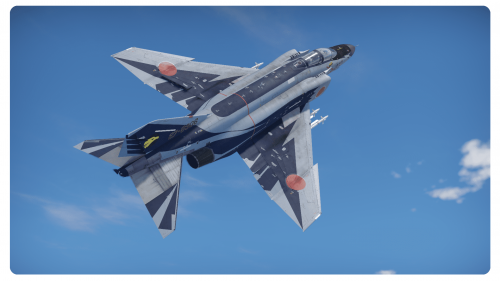
- Videos
See also
- Related development
- Aircraft of comparable role, configuration and era
- Mikoyan-Gurevich MiG-21 (Family)
- SAAB J35D Draken
- Dassault Mirage IIIC
External links
| Japan jet aircraft | |
|---|---|
| IJNAS | |
| Experimental | Kikka |
| Reconnaissance | R2Y2 Kai V1 · R2Y2 Kai V2 · R2Y2 Kai V3 |
| IJAAS | |
| Fighters | Ki-200 |
| JASDF | |
| Fighters | F-86F-30 ▅ · F-86F-40 ▅ · F-86F-40 JASDF▅ |
| F-104J | |
| F-4EJ Phantom II · F-4EJ ADTW · F-4EJ Kai Phantom II | |
| F-15J · F-15J(M) | |
| F-16AJ | |
| F-1 | |
| Trainers | T-2 Early · T-2 |
| Foreign | |
| Thailand | ▄F-5E FCU |
| Japan premium aircraft | |
|---|---|
| Fighters | Hagiri's A5M4 · A7He1 · Ki-27 otsu Tachiarai |
| Ki-44-II otsu · ▅Bf 109 E-7 · ▅F4U-1A · Ki-100-II · Ki-44-I 34 | |
| ▅Fw 190 A-5 · A7M1 (NK9H) · Tada's Ki-61-I hei · ▅P-51C-11-NT | |
| J2M4 Kai · A6M5 Ko · A6M6c · J2M5 · Ki-87 · J6K1 | |
| Twin-engine fighters | Ki-96 |
| Jet fighters | F-86F-40 JASDF▅ · T-2 Early · F-4EJ ADTW |
| Bombers | Ki-21-I hei · Ki-48-II otsu · H8K3 · B7A2 (Homare 23) · ▅B-17E |


